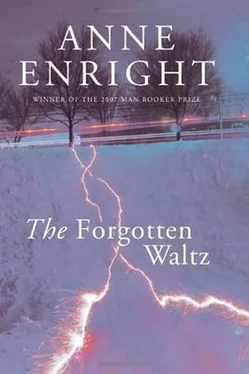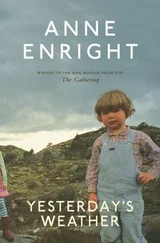I opened the glove compartment and looked at the CDs.
‘Guillemots! Is this yours?’
‘Yeah,’ he said.
And he drove back to the hotel too fast, where I failed to seduce him on my way to the shower and he failed to seduce me on my way out of it. And on it went. We risked a meal in town, and hated it. Then we came back and fought. I sat on the bed and cried. I said, ‘Why are you so horrible to me?’
He paused. He walked to the window and pulled back the curtain to watch the darkness, or his own reflection in front of the darkness. Then he let the curtain drop.
‘Gina,’ he said slowly, like he was explaining something it had taken him a while to understand. ‘We don’t really know each other.’
Which didn’t stop us acting like we did. We had four whole rooms to do it in, I could slam a cupboard door in the kitchenette, he could clear his throat while sitting on the side of the bed to undo his shoes. I could drink a glass of wine at the table while he shook out the newspaper on the sofa behind me. He could stand at the bedroom window and look out at the car park while I shifted through the stations on the remote control. We could move about like this: as though we had a claim on each other, as though we were intimate. But we were only playing at these things. I knew that too. The way we leaned or sat, or directed our gaze; the gestures and arrangements we made of ourselves: living room, bedroom, bathroom, hall. And then later when we went to bed, the same play with pillow and duvet, turning towards or away from each other, and even our breathing a kind of demonstration.
In the darkness, something gave.
Seán said his marriage was unbearable. Not over but ‘unbearable’.
‘You have no idea,’ he said.
It reminded me of his daughter sitting on her bedroom floor and saying just that. ‘You have no idea.’ The things I have to put up with .
But we did not talk about his daughter, and when I offered to talk about Conor, that felt wrong, too.
We talked about Aileen. Of course. We talked about his wife – because that is the thing about stolen love, it is important to know who it is you are stealing from.
‘You don’t understand,’ said Seán. But I did understand; the wrongness of his wife, whatever it was, and her inescapability. And to be honest, I was a bit fed up with his wife, who was always somehow there . A part of me was beginning to think she was probably quite a nice woman, that there was nothing appalling about her.
‘She just. You know…’
‘I know.’
We brought it to a close. We played at being in love or not being in love, and even the sex, when it finally happened, wasn’t great, and in the morning, we packed up our things and went home.
At the train station, I sat in the car and said to him, ‘No more.’
He closed his eyes briefly and said, ‘No more.’ And we didn’t know whether to kiss or not, so I just got out, and he popped the boot and came round to get my bag like a taxi man. He said, ‘Have a good journey,’ and I said, ‘Thanks.’
I had a window seat, I looked out over the countryside, the stone walls of Sligo giving way to Leitrim bog. When we crossed the Shannon I was in love with him. By Mullingar I thought, if I did not see him soon again, that I would surely die.
Ev’ry Time We Say Goodbye
THREE WEEKS LATER, on the fifth of May, my mother collapsed, in the middle of the afternoon, and was taken by ambulance to Tallaght Hospital. Luckily – if you could call it luck – it happened when she was out of the house. She was near Bushy Park at the time, though what she was doing there was a bit of a mystery. Joan never went down to the park. She used to say it was too close by to bother with and that, after the first twenty years or so, she gave up feeling guilty about all that fresh air. But it was outside the park gates that she held on to the bonnet of a car and then sat down on the ground. We did not know whether she was going there or coming back, we heard about the car from a woman in one of the houses opposite, who told us the story after the removal to Terenure church. As well she might: it was a good story.
‘I did not see her hit the ground,’ she said. ‘She was the other side of the car from me, and she just sank down. When I came out she was sitting there, with her legs straight out, for all the world like a toddler or a little child, and her lovely camel coat fanned out on the path behind her.’
This woman, who seemed to know who we were, and who my mother was, and all her different coats, wanted to hand me a phone.
I did not want to take it. I did not see why I should.
‘I found it later, after the car was gone.’
We were pretty sure it was our mother’s phone, though the battery was now flat and neither Fiona nor I had the heart to recharge it. It made us wonder how much Joan knew, or guessed – the strange trip she made towards the park and, just before she fell, the attempt at making a call. It made us wonder how scared she was; not just the moment she reached for the bonnet of a stranger’s car, but in the hour before that, or the day. And if a day – then what? The same thought was in both our minds: our mother had been frightened for a long time – months, a year perhaps – she had been frightened, and we had not seen it, and now she was beyond our soothing.
It was the loss of her mobile that delayed everything, I think. The first I heard was a phone call from the duty nurse at ten o’clock that night, explaining that our mother had been taken to the hospital, and perhaps I would like to come in. I mean, the woman was dead, she was effectively dead, but this must be what they say to relatives in such circumstances. And I knew this and did not know it, at the same time.
So this might be why I did not ask what had happened, or how Joan was now. It was because I knew this nurse, with her competent, lovely-Irish-girl voice, would not tell me, and that would make me hate her.
‘Certainly,’ I said. ‘I’ll be there as soon as I can.’
And she told me the name of the ward.
Fiona rang as soon as I put down the phone.
That day was a Saturday, and though I might easily have had a few glasses of wine, I was, in fact, sober – I must have been on a diet – and for this I was grateful. For the fact that I knew exactly what was happening, felt every step I took along the fluorescent corridors of the hospital night, and into the room where she was all wired up and ready to go. Fiona arrived with Shay. He and Conor talked to a doctor outside the door. They got us coffee from a vending machine. People passed, now and then. There was the flabby ker-clack of a distant zimmer frame, a horrible, wet fit of coughing. We sat with her into the early hours.
I don’t know if I hated my sister as she sat in the room a few feet away from me or loved her. Whenever I looked over at her she seemed bizarrely separate from me, and the wrong age.
She is tiny, Fiona. I outgrew her when I was eleven. I don’t know how she got pregnant, with that child’s pelvis, it seemed so wrong. Now there she was, her knee beside her white face, the heel of her boot hooked on to the edge of the chair. How are you supposed to sit, when your mother is dying; when your mother is, effectively, already dead? I sat the way Joan taught me to: shoulders straight, hands loosely laced in my lap, legs crossed and angled slightly, to maximise the length of thigh. Like an air hostess. That is the way I sat, as my mother died.
My mother was a great beauty, in her day; more beautiful than either of her daughters, and all her bones were slender and long.
Conor told us that the doctor would let her go whenever we were ready. He said this without looking at anyone. He said it after leaning forward in his chair and taking up Joan’s hand, and laying the palm of it along his cheek, and then setting it back on the counterpane. I did not want him to touch her, actually, I did not want anything to happen. And I can’t remember any further discussion about this matter, but at perhaps one o’clock in the morning, the doctor, or whatever he was, came in and touched my arm. He had beautiful, compassionate eyes. He told me his name, which was Fawad. Then he flicked a couple of switches – they didn’t look like much – while a nurse took the tubes away. He touched my arm again before he left the room, and I was glad I had met him. I thought, perhaps absurdly, that he had a great soul.
Читать дальше












